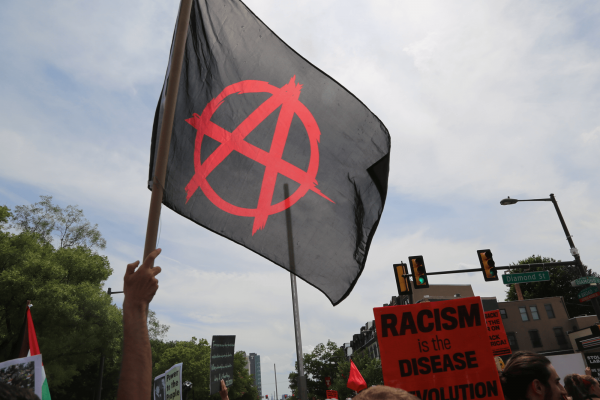BEN WILDFLOWER IS a self-described “high-church lowlife.” He lives in Kensington, a Philadelphia neighborhood that’s also home to intravenous drug users and sex workers. Wildflower—the surname he and his wife adopted after their marriage—is white, bearded, and male; he grew up among conservative evangelicals but now attends an Episcopal church (“a wonderful, welcoming space for so many people alienated by the church,” he said, “but also a bizarre, bourgeois institution”). Sometimes he fixes his roommates’ bikes to cover rent; he aims to live on very little.
I came across Wildflower through his handmade religious prints that resemble the black-and-white woodcuts found in The Catholic Worker , albeit with a little more attitude: “O Mary conceived without white supremacy,” reads one of Wildflower’s prints featuring the Holy Mother using aerosol flamethrowers to destroy Confederate and Nazi symbols, “pray for us trying to dismantle this shit.”
Wildflower doesn’t love the word “anarchist” because it sounds too self-assured (“like how a super-duper Reformed person has answers for everything”) and often evokes scenes of white dudes eager to break stuff and punch cops. But he sticks with it: “I’m an anarchist because I oppose hierarchical power structures,” said Wildflower. “You apply it to sex and gender, you have ‘feminism.’ You apply it to white supremacy and racism, and you have ‘anti-racism.’ So what is it when you apply it to the modern state? I guess we don’t have a word better than ‘anarchism.’”
Does it bring joy?
IN THE PAST four years, it’s been tempting to believe the main problem with U.S. democracy is the current occupant of the White House and the electoral politics that paved his way to office. But Christian anarchists offer a different perspective.
“The thought of America crumbling should bring you joy,” Wildflower told me in an interview last spring. As Christian anarchists see it, the problems that exist in our nation—poverty, white supremacy, militarism, economic inequality, and on down the list—are not aberrations in an otherwise good system, but rather inescapable outcomes of any system where some people have been put in power over others. And as people of God, Christian anarchists feel called to dismantle these oppressive systems and create radical alternatives.
Take prisons: “I think people are valuable and shouldn’t be warehoused in cages,” said Wildflower. “I don’t think [prison] changes people; I don’t think it makes us safer; I think it’s a tool to control and impoverish communities of color. I want it to be destroyed.” Though he participates in what he calls “reformist” actions, such as voting for a better district attorney or advocating to change sentencing laws—something his younger anarchist self would have scoffed at, but that he felt was important after listening to women and people of color in his community—he doesn’t feel those actions will ever fix the underlying problem. “A system that holds people accountable for injustices looks so unimaginably different than the prison system, that I’m still totally on the ‘burn it down’ side.”
Read the Full Article

